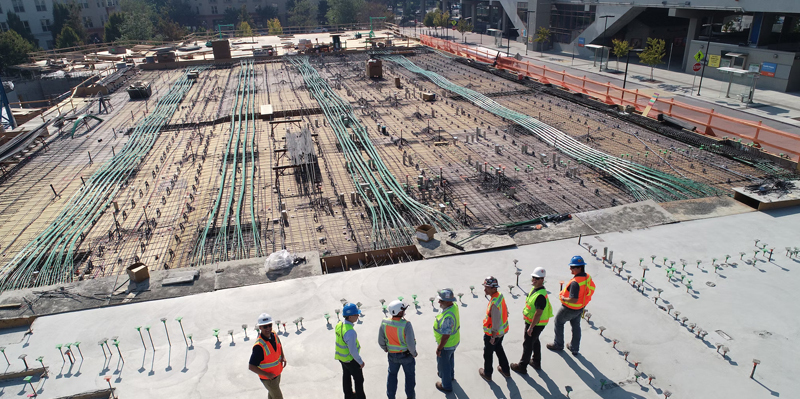This article will delve deep into the nuances of a Bid Bond vs Performance Bond, highlighting their key differences, real-world applications, and their broader implications in various industries.
Whether it be in construction or the general world of contract-based work and industries, understanding the distinction between a bid bond and a performance bond is paramount. These two instruments, while serving different purposes, collectively ensure the smooth execution of projects.
The Concept of a Bid Bond
A bid bond is more than just a financial guarantee; it’s a testament to a contractor’s commitment and capability. It ensures that if a contractor wins a bid, they will accept the project and meet all bid requirements, including proceeding with the work committed to in the provided tender.
Bid bonds are typically issued in the amount of ten percent (10%) of the contract value or tender amount, but they can also be issued in a specific dollar amount if required.
A common trait for bid bonds is to be on CCDC format wordings and to have a validity period of 30, 60, or 90 days. The validity period can sometimes be longer than this, but it is an important part of the bond specifics as once that validity period is up the guarantee to proceed with tendered work is no longer
An Overview of Performance Bonds
Performance bonds, on the other hand, are a reflection of a contractor’s dedication to quality and timeliness. They guarantee that the contractor will adhere to the terms and conditions of the contract, providing a safety net against potential losses if the contractor defaults or fails to meet their obligations.

Bid Bond vs Performance Bond in Diverse Industries
Construction: In the construction sector, bid bonds are often the first step in a long contractual process. They ensure that contractors are serious about their bids, preventing project delays. Performance bonds, meanwhile, ensure the structural integrity and quality of the construction, safeguarding the interests of both the project owner and the public.
Tech Procurement: In the rapidly evolving tech industry, bid bonds ensure that tech firms have the financial backing and technical expertise to deliver on their promises. Performance bonds, on the other hand, ensure that the end product, be it software or hardware, meets the stipulated specifications and performance metrics.
Healthcare: The healthcare sector, with its emphasis on public safety and well-being, requires stringent measures. Bid bonds ensure that pharmaceutical companies or medical equipment suppliers are genuine in their intent, while performance bonds ensure the quality and efficacy of medicines and equipment.
Entertainment: In the world of entertainment, where large sums of money and public expectations are at stake, bid bonds ensure that event management companies are financially sound. Performance bonds, meanwhile, guarantee that events, be it concerts or theater productions, meet the highest standards of quality and safety.
These industry requirements will also vary across region. At Bond Connect, we’re familiar with standardized bond wordings and scenario specific needs depending on which province of Canada you’re located in and can even do international guarantees, including in the United States.
Tender Bonds vs Final Bonds
When learning about contract surety bonds in general, understanding their classification based on the phase of a project they cater to is essential. Broadly, these bonds can be categorized into Tender Bonds and Final Bonds.
Tender Phase Bonds:
Tender bonds come into play during the tendering or bidding phase of a project. Their primary purpose is to ensure that the bidding process is genuine, competitive, and free from frivolous bids. Here are the key types of Tender Bonds:
Bid Bonds: As previously discussed, bid bonds act as a guarantee to the project owner. They ensure that if a contractor’s bid is accepted, the contractor will proceed with the project and not adjust pricing or any execution specifics until the actual work will begin.
Consents of Surety: A Consent of Surety is often provided alongside a bid bond. It’s an agreement from the surety (bonding company) that, should the contractor be awarded the project, the surety will provide the necessary performance and payment bonds for the contract.
Final Bonds / Contract Phase Bonds:
Once a bid is accepted and the project moves into the execution phase, Final Bonds come into play. These bonds ensure the proper execution of the project and the fulfillment of all contractual obligations. The primary types of Final Bonds are:
Performance Bonds: These bonds guarantee that the contractor will adhere to the terms and conditions of the contract.
Labour & Material Payment Bonds: These bonds are typically issued alongside performance bonds. They guarantee that the contractor will pay for labor and materials used in the project.

Deep Dive into Bid Bonds vs Performance Bonds
Financial Implications: Bid bonds usually cover a percentage of the bid amount, acting as a deterrent against frivolous bids. Performance bonds, with their comprehensive coverage, ensure that contractors have a strong financial incentive to complete projects as per stipulated standards.
Legal Aspects: Both bid bonds and performance bonds have legal implications. They can be invoked in case of breaches, ensuring that project owners have legal recourse in case of defaults.
Duration: While bid bonds are short-term instruments, valid only till the bidding process is complete, performance bonds are longer-term, often lasting for the duration of the project and even beyond, covering post-completion maintenance and warranty periods.
Broader Implications of Contract Surety Bonds
Global Trade: In the realm of international trade, these bonds foster trust across borders, ensuring that international contractors adhere to the same standards as local ones.
Economic Stability: By offering security and reducing the risks associated with large projects, these bonds play a role in stabilizing economies, ensuring that large projects, which often have significant economic implications, are completed smoothly.
Setting Industry Benchmarks: Indirectly, these bonds play a role in setting industry standards. The stringent requirements associated with obtaining these bonds ensure that only the most capable and committed contractors are selected for projects.
Case Studies for Surety Bonds
1. Roadway Infrastructure Project in City of Surrey, British Columbia:
- Situation: A construction company won a bid to renovate a major highway in Surrey. They provided a bid bond as a guarantee of their commitment on a public RFP.
- Outcome: After being awarded the contract, they reviewed their tender proposal and realized an estimator had missed a crucial part of the contract. The contractor let the municipality know they’ll need to change their bid price. The bid bond was invoked, compensating the city for the costs of finding a new contractor and/or the difference in price between what was quoted and what was missed.
- Lesson: The bid bond protected the city’s interests and ensured that public funds weren’t wasted due to unforeseen contractor mistakes. It’s important to understand that the contractor would still be responsible for these financial damages, but the bond is the guarantee the city would call on first.
2. New Wing Construction at a Hospital in Toronto, Ontario:
- Situation: A contractor was awarded a project to build a new wing for a hospital in Toronto. Midway through the construction, the contractor faced severe financial issues, jeopardizing the potential for any sort of completion of the project.
- Outcome: The contractor was unable to complete the project due to these financial problems. The performance bond was utilized to source another contractor to finish the construction and ensure the hospital wing met the scheduled deadline for completion.
- Lesson: Performance bonds can act as a safeguard, ensuring that projects are completed even when unforeseen financial challenges arise for the contractor having the bond issued.

Frequently Asked Questions on Bid Bonds & Performance Bonds
Q: What is the primary difference between a bid bond and a performance bond?
A: A bid bond ensures that if a contractor wins a bid, they will accept the project and meet all bid requirements. A performance bond guarantees that the contractor will adhere to the terms and conditions of the contract.
___
Q: How long is a bid bond valid?
A: Bid bonds typically have a validity period, often 30, 60, or 90 days, but this can vary. Once the validity period is up, the guarantee to proceed with the tendered work is no longer in effect.
___
Q: What happens if a contractor fails to complete a project?
A: If a contractor fails to complete a project, the performance bond can be invoked. This means the surety company that issued the bond will either finance the contractor to complete the job or hire a new contractor to finish the project.
___
Q: Can a bid bond be converted to a performance bond?
A: No, they are distinct instruments. However, once a bid is accepted, a performance bond is typically required to guarantee the execution of the project.
___
Q: How much does a bid bond cost?
A: The bid bond itself is actually provided free of charge; however, this is only available to you once you have setup what’s called a ‘bond facility’. This is an underwriting process where corporate and personal financial statements, and other business specifics are reviewed to deem if you are ‘bondable‘. A bond facility is in the range of $3,000 per year.
___
Q: How much does a performance bond cost?
A: A performance bond will vary in pricing based on your bond facility specifics, the contract value of the project, the duration of the project, wordings to be used on the bond, as well as other factors. A decent estimate will often be about 1.5% of the contract value.
___
Q: Who pays for the bond – the contractor or the project owner?
A: The contractor usually pays for the bond. However, the costs are often incorporated into the bid / tender price, indirectly passing the expense to the project owner or obligee.
Concluding Bid Bond vs Performance Bond
The intricate relationship between Bid Bonds vs Performance Bonds is highlighted every day and used in industries worldwide. While they serve different stages of a project, their collective aim is to ensure trust, commitment, and the smooth execution of projects – all regulated by a third party guarantee.
As industries evolve and projects become more complex, the importance of understanding Bid Bond vs Performance Bond will only grow, ensuring that all parties involved are protected and projects are completed to the highest standards.
Whether it be in the construction field, waste management, or any other industry, don’t hesitate to reach out and connect if you have any questions or would like to have a bond facility in place for your business.






